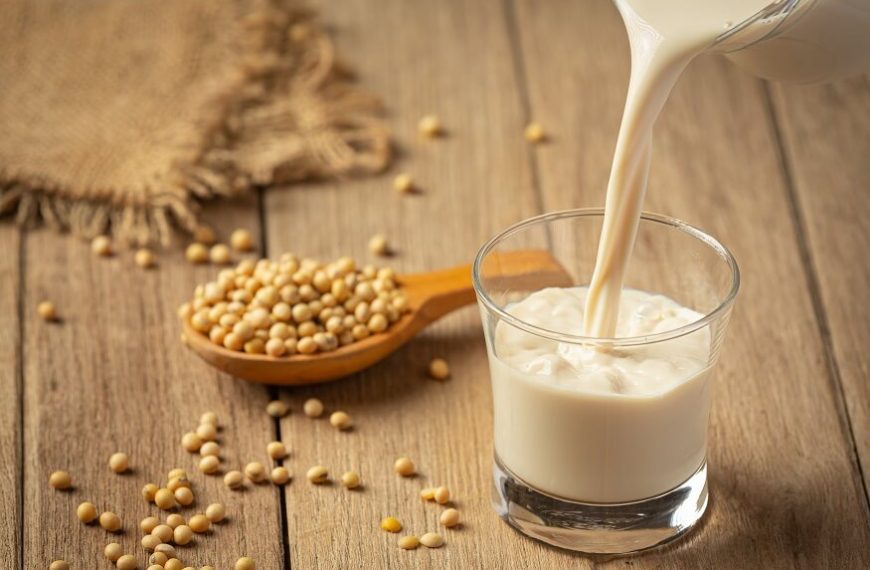Adults frequently replace soy milk with regular milk. But can infants have soy milk as well? Plant-based kinds of milk are an excellent alternative to conventional cow’s milk for some individuals, particularly those with lactose sensitivity.
But may infants and young children benefit from non-dairy milks like soy milk as well? What you should know about soy milk for infants is provided here.
What Is Soy Milk?
Soy milk is created by cooking soybeans, and it includes fiber, natural or added sugars, and soy protein. A 4-ounce glass of soy milk has roughly 40 calories, 3 to 4 grams of protein, 2 grams of fat, and a half-gram of sugar, however, the nutritional value can vary from brand to brand.
Minerals, including calcium, iron, and potassium, are also present.
Should Babies Drink Soy Milk?
Breast milk or formula (with a bit of water once they start solids) should be the only kind of milk given to infants under the age of one. They should not consume cow’s milk, soy milk, or any other plant-based milk.
The majority of plant-based kinds of milk are insufficient sources of the numerous nutrients that newborns require in the early stages of life, while cow’s milk contains too many proteins and minerals for babies’ stomachs to process.
Doctors advise kids to consume mostly water and cow’s milk between the ages of 1 and 5. But because fortified soy milk is nutritionally comparable to cow’s milk, it may be used in place of the latter.
Therefore, if your child does consume soy milk before the age of five and after the age of one, make sure it is unsweetened and fortified. Two to three cups of whole milk per day are recommended for children aged one to two.
Fortified soy milk is a suitable replacement for cow’s milk if your child has a medical condition, such as a dairy allergy or lactose intolerance, or if your family doesn’t consume animal products.
Is Soy Milk Good For Babies?
Babies under one year old shouldn’t drink soy milk. Contrary to soy milk, breast milk, and baby formula provide all the necessary nourishment for infants. After the age of one, your child should keep to full, unsweetened cow’s milk; however, if your family is vegan or your child has a milk sensitivity or other underlying medical condition, fortified, unsweetened soy milk is a suitable substitute.
To choose the finest soy milk for your child, see your pediatrician. Be sure to choose a brand of soy milk that has been approved by your doctor since not only may the nutritional value of soy milk vary by brand, but experts also point out that our systems might not be able to absorb nutrients from plant-based kinds of milk as effectively as they do from dairy milk.
Is Soy Milk Safe For Babies?
Only breast milk or baby formula should be given to infants under the age of six months, and even once you start introducing solid foods into her diet, she should only have a few sips of water in between meals rather than cow’s milk or soy milk.
After the age of one, you should only offer your child ordinary, unflavored cow’s milk or fortified, unsweetened soy milk if she has a milk allergy or intolerance or follows a vegan diet.
A significant source of protein, calcium, potassium, and vitamins A, D, and B12 is cow’s milk. But, with the notable exception of certain fortified soy milk, plant-based milks can have varied amounts of nutrients and aren’t a perfect substitute for dairy products.
When Can I Give My Baby Soy Milk?
Starting at age 1, you can feed your kid fortified soy milk, advised by your pediatrician if she has a milk allergy or intolerance or if you are parenting her vegan.
You might be better off delaying introducing plant-based kinds of milk to your child till she is older if they don’t have any medical conditions or if your household consumes animal goods. The top children’s health organizations in the US advise parents to avoid giving their young children plant-based milk like oat or almond milk in place of cow’s milk, with the exception of fortified soy milk.
Soy Milk vs. Cow’s Milk For Babies:
Experts note that cow’s milk has more nutrients, cup for cup, than plant-based milk, with the exception of certain fortified soy kinds of milk. For instance, compared to the 105 calories and 6 grams of protein in soy milk, 1 cup of whole milk has 149 calories and around 7 to 8 grammes of protein.
Additionally, whole milk has more sugar and fat. In comparison to soy milk, which has roughly 3.5 grams of fat and 9 grams of sugar per cup, cow’s milk has 8 grams of fat and 12 grams of sugar per cup.
One cup of whole milk has 276 milligrammes of calcium and 322 milligrammes of potassium, but one cup of soy milk has 300 milligrammes of calcium and 298 milligrammes of potassium in terms of vitamins and minerals.
Soy Milk And Phytoestrogens:
Phytoestrogens, commonly referred to as plant oestrogens or isoflavones, are substances found in soy milk. While concerns about phytoestrogens and breast cancer have surfaced over the years, other research suggests that isoflavones may offer protection from conditions including breast, endometrial, and prostate cancer.
There is no proof that soy’s isoflavones harm children’s hormones or development, despite claims that excessive doses of phytoestrogens may have this impact. This is according to Paediatrics, the journal of the American Academy of Paediatrics.
Should I Give My Baby Soy Milk If She Has A Dairy Allergy?
If your kid is older than one and has a milk allergy, which is relatively uncommon, affecting only 2 to 3 percent of infants, or an intolerance to lactose (a kind of sugar found in milk and dairy products), you can give them fortified soy milk.
To pick the best plant-based milk for your child, however, it’s crucial to see your pediatrician or a qualified dietitian because soy milk, for example, might differ depending on the brand.
Soy Milk And Calcium:
Although certain soy kinds of milk have a tiny bit more calcium than cow’s milk, they also have phytates, which might prevent your child from absorbing calcium. Ask your pediatrician if you should give your child extra calcium-rich foods like spinach and fortified cereals if you are giving her soy milk instead of cow’s milk.
When To Call The Doctor:
Even though milk allergies in infants are uncommon, it’s important to understand the symptoms. Newborns who are formula-fed are responding to the milk proteins in the formula itself, whereas breastfed newborns might have an allergic reaction to the milk in their mothers’ diets.
Frequent spitting up, signs of stomach pain, vomiting, diarrhea, blood in the stool, wheezing, difficulty breathing, coughing, and itchy, watery, or swollen eyes are some indicators of a milk allergy in infants. If you think your kid could have a milk allergy, call your pediatrician.
While some kids could benefit from fortified soy milk as a milk alternative, practically all kids are advised to consume traditional cow’s milk until they are at least five years old. Infants younger than one-year-old should only have breast milk or formula (added to a little amount of water once they begin solids around six months), while children aged one and above should only consume unflavored cow’s milk.
















